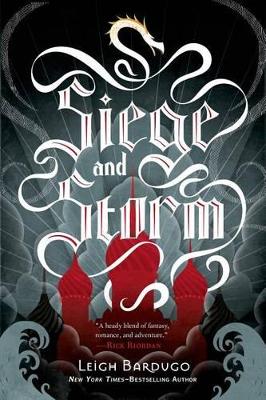
girlinthepages
You know that feeling after you read a book when you just want to curl up into a ball and sob because the ending winds your nerves so tight and them snaps them beyond repair?
Or when you literally cannot think about anything else because you're still stuck in that post-book daze? (Or book hangover, as I like to call it)
All of the above describe how I felt (and still feel) after finishing Siege and Storm a few hours ago. I could barely even focus on my pizookie at BJ's because a part of me couldn't stop thinking about it.
I hardly know where to begin.
First and foremost, Bardugo really enhances her character development skills in this book. While Alina still has moments when she bothers me (you are in the middle of a war and the head of an army, can you please stop being so self conscious about Zoya?) she starts to really come into her power and authority in this book (despite Mal's best attempts to try and stop her). Her relationship with the Darkling is a complex as ever, which I enjoy, because it makes her character grapple with the shades of grey between right and wrong, good and evil, and see both sides of a civil war. And Sturmhond. He was utterly fantastic, not just because of his witty dialogue and inherent likability, but because he is the most complex character in the series and his depth and ever-changing motives make him a pleasure to read for an advanced reader. And the plot twist centered around him that is revealed early on in the book took me completely by surprise, which I was glad for as many of the plot twists in the first book were somewhat predictable.
I was also impressed by Bardugo's pre-planing of themes in the first book to be carried out throughout the series, such as with the amplifiers. And finally, finally this book became filled with the heavy political intrigue, civil war, and religious complexity that I knew the foundations of the fantasy world of Ravka were capable of. Gone is the feeling of the boarding-school drama, and instead is a look at political unrest, the abuse and neglect of the upper classes, the fanaticism centering martyrdom, and a discussion about what is Small Science vs. what is magic. I loved seeing the idea of Grisha who existed outside of the traditional system, who rejected the notion of being puppets in a larger political system. I loved the acknowledgement of Alina that some of the Darkling's motivations were understandable, such as an overthrow of the Monarchy to end the oppression and slavery of the Grisha of being born with special abilities. I loved that Bardugo left little hints in the first book that turned into huge plot points in the second. And I love that the casualties and betrayals at the end were enough to leave me clutching my heart because it means that the author managed to construct characters that I cared about (for the most part anyways).
Yet while this book was a huge step up from the first one, it was not a five-star read because there were still elements that nagged and annoyed me as reader and interrupted the smooth and quick pace of the rest of the story. Let's deconstruct Mal for a moment. Mal and Alina have no chemistry. All of their interactions are lackluster, and many are petty. He doesn't treat her very well, and doesn't accept her for what she is, and instead of rising for the challenge and fighting for her all he does is whine about how he doesn't fit in at the Little Palace and he wishes she would turn her back on life as a Grisha. If Bardugo was trying to construct a believable love triangle, or love rectangle for that matter, it has fallen flat on its face, as I find redemption for the Black Heretic more likely than ever seeing any chemistry between Mal and Alina. In fact, the more Mal whines the more I see reasons for the Sun Summoner and the Darkling to be better lovers and co-rulers, for their powers are mirrors of each other, and her draw to him is a part of her life as a Grisha, despite Mal constantly trying to shame her for it. Like calls to like.
There is still more I'd like to see from this series. More explination of the Small Science. More background on the Darkling. More agency and activism by Alina instead of her constant worrying over upsetting Mal. With the dramatic end of Siege and Storm I believe Bardugo will answer many of these concerns in the next installment, Ruin and Rising. So while I anxiously await the next three months for the final installment, I leave you with these parting words from the book's epilogue to encourage you to read a series that has shown growth and ends with promise:
For the living and the dead, she would make herself a reckoning.
She would rise.




